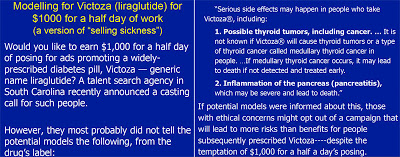“Facing growing evidence that some of America’s top-selling diabetes medicines could lead to pancreatic disease, federal regulators [see FDA notice here] on Thursday opened an unusual review of drugs from Merck & Co., Bristol-Myers Squibb Co. and other pharmaceutical makers,” reports the Wall Street Journal (here).
Some of the “evidence” may have come from Public Citizen in a petition it filed in 2010 with the Food and Drug Administration (FDA). That petition called on the agency to “immediately remove from the market the increasingly prescribed diabetes drug Victoza because it puts patients at higher risk of thyroid cancer, pancreatitis, serious allergic reactions and kidney failure that outweigh any documented clinical benefits.”
The Public Citizen press release states the case regarding pancreatitis:
“Even in the small numbers of patients in clinical trials, pancreatitis was increased 3.7-fold in patients getting Victoza over that seen in patients getting other diabetes drugs; additional cases of pancreatitis continue to be reported to the FDA in alarming numbers, considering how few adverse events are ever reported. In the first 17 months of Victoza being on the market, 200 patients were diagnosed with acute pancreatitis, according to Public Citizen’s review of the FDA’s adverse event database. Because only an estimated 10 percent of cases are reported, potentially as many as 2,000 patients or more have suffered a painful and serious outcome as a result of taking Victoza.”
At the recent Selling Sickness conference in Washington, DC, Wolfe gave a rousing keynote presentation in which he spoke about the “selling sickness” aspect of marketing Victoza in spite of its dangerous side effects:
(function() { var po = document.createElement(“script”); po.type = “text/javascript”; po.async = true; po.src = “http://d15mj6e6qmt1na.cloudfront.net/assets/embed.js”; var s = document.getElementsByTagName(“script”)[0]; s.parentNode.insertBefore(po, s); })();
Here are his slides related to Victoza:
Appealing to the “ethical concerns” of models and modeling agencies is not, IMHO, going to get very far. Instead, Wolfe should focus on Novo’s use of celebrities, caregivers, patients, and contests to sell this drug (see, for example, “We Do Hope Y’All Will Enter! Contests Guarantee ROI for Diabetes Drug Marketing“). Some celebrities might have “ethics” to appeal to, but more importantly, they have a stake in this issue as do patients and caregivers.
Wolfe surmises that the models were not informed of the dangerous possible side effects of Victoza. But models do not have to be informed if they are not taking the drug. Paid celebrities, on the other hand, must be informed. I am sure, for example, that Paula Deen — Novo’s Victoza celebrity spokesperson — was duly informed and is followed closely by her physician for any signs of side effects.
It would be very damaging to Novo’s marketing efforts if Deen developed problems related to Victoza. That would not be so easy to cover up as it is to ignore the thousands of Victoza users who may be suffering from side effects in silence because they are not being so closely monitored by their physicians as is Deen. Also, the adverse event reporting system in the U.S. is so dysfunctional, as much as 90% of adverse events go unreported, as noted by Public Citizen.









![6 Digital Tools at the Center of Healthcare Digitalization [INFOGRAPHIC]](http://ec2-54-175-84-28.compute-1.amazonaws.com/pharma-mkting.com/wp-content/uploads/2021/04/6DigitalTools_600px-100x70.jpg)




